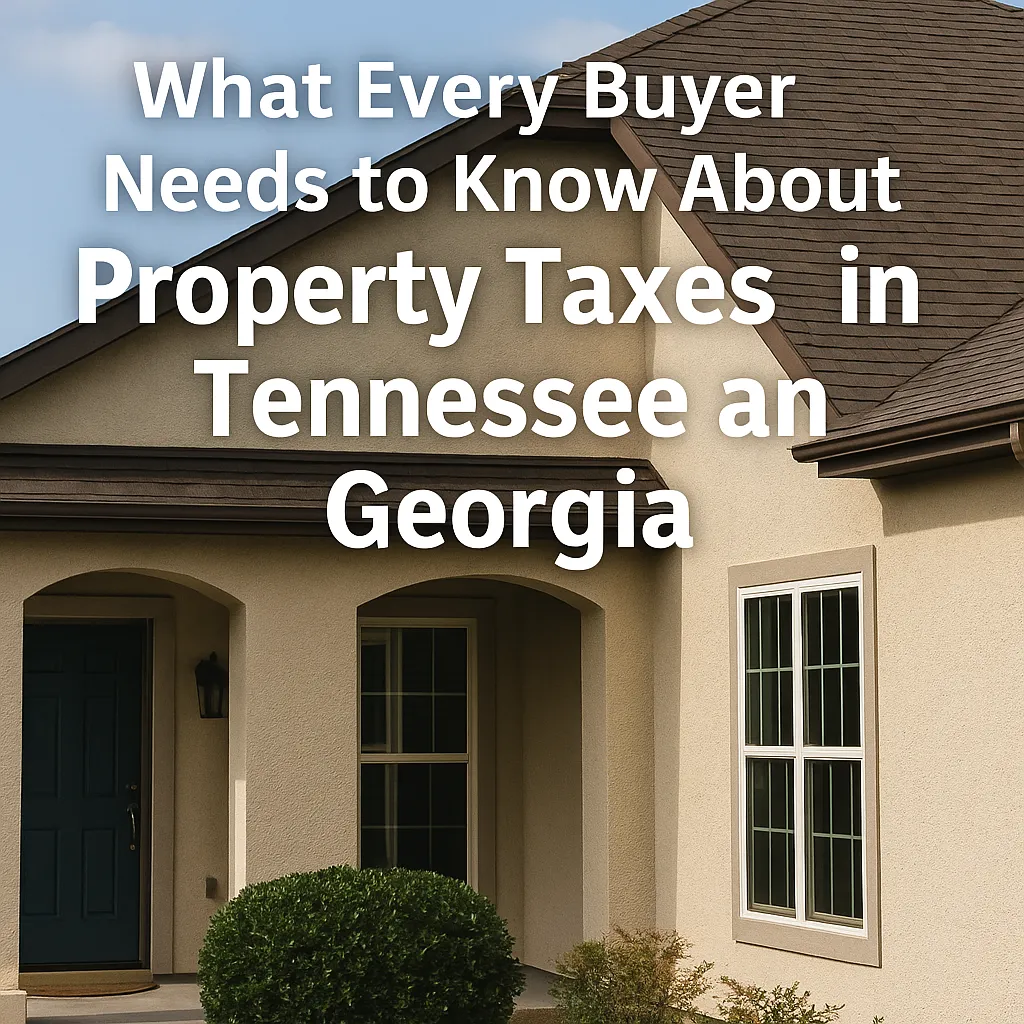
What Every Buyer Needs to Know About Property Taxes in Tennessee and Georgia
What Every Buyer Needs to Know About Property Taxes in Tennessee and Georgia
Introduction: Welcome to the Wild, Taxing World of Real Estate
You’ve found the dream home. It’s got a porch swing, a view of the mountains, maybe even a backyard big enough for a dog named Duke. You’re ready to make the leap—but then someone whispers those dreaded words: property taxes. Suddenly, you’re Googling things you’ve never thought about, like “millage rates” and “homestead exemptions,” wondering if buying in Tennessee or Georgia is about to get a lot more complicated.
Here in Chattanooga Valley and the surrounding areas, real estate is as diverse as the terrain. One minute you’re looking at a cozy mountain cabin in Georgia; the next, a chic mid-century gem on the Tennessee side of the line. But that state line? It matters. Big time.
In this post, we’ll break down exactly what you need to know about property taxes in Tennessee vs. Georgia—and how to make the most financially savvy decision for your next home purchase. Get ready for tips, laughs, local insights, and a few real estate myths that need busting.
Property Taxes 101: Let’s Break It Down Like a Pro (But Friendlier)
🏡 What Are Property Taxes, Anyway?
In the simplest terms, property taxes are what you pay to support things like schools, roads, public safety, and more. But they’re not the same across the board—in fact, Tennessee and Georgia do things very differently.
Let’s compare:
Feature
Tennessee
Georgia
State Property Tax
None
Yes (tiny, but it’s there)
Average County Rate
0.64%
0.92%
Homestead Exemptions
Limited
Generous and customizable
Assessment Ratio
25% of value
40% of value
Reassessment Frequency
Varies by county
Usually every 3 years
H2: Tennessee: The Volunteer State’s Tax-Friendly Charm
Tennessee is known for not having a state income tax—and that friendliness carries over into property taxes as well. Here’s what makes Tennessee a buyer’s best friend:
H3: ✅ Low Rates, High Value
Counties like Hamilton (where Chattanooga Valley sits) have some of the lowest effective tax rates in the country. That means you’re likely to get more house for less tax here.
Crazy fact: A $250,000 home in Chattanooga could have annual property taxes under $1,600, compared to over $3,000 in other parts of the country.
H3: ⚠️ The Myth of “No Property Taxes”
Some buyers think that “no state property tax” means they won’t pay much at all. But remember—counties and cities still charge taxes, and they vary. For example:
Hamilton County: ~2.219% combined city + county tax (if you’re in city limits)
Marion County (more rural): Lower rates, fewer services
H2: Georgia: Slightly Higher, But Packed With Perks
Don’t count out the Peach State just yet! While Georgia’s rates are slightly higher, their homestead exemptions can save you big bucks.
H3: 🍑 Exemptions That Actually Mean Something
In Georgia, the Standard Homestead Exemption lets you knock a good chunk off your assessed value—and some counties add even more reductions for seniors, veterans, and disabled homeowners.
Example: If your $200,000 home qualifies for a $30,000 exemption, you’re only taxed on $170,000. That’s real money.
Real Talk: If you’re planning to stay a while, Georgia’s exemptions can eventually make your tax bill look like a typo.
H3: 💼 Local Insight: North Georgia Deals
Buyers flocking to areas like Lookout Mountain, Trenton, and Ringgold are often drawn by the mix of small-town charm, slightly lower home prices, and still manageable taxes.
H2: Top 5 Tax Tips for Buyers in Chattanooga Valley 🧾
Here’s your no-BS list of what every buyer needs to do before buying in Tennessee or Georgia:
1. Check the County Assessor’s Website
Every county lists its millage rates, exemptions, and tax estimate tools. Look it up—seriously.
2. Ask for the Last Tax Bill
Never guess! Sellers (or your agent) can provide a copy of last year’s bill. Use this as a baseline.
3. Don’t Trust the Zestimate
Zillow doesn’t calculate local tax quirks. Always double-check with local professionals.
4. Factor It Into Your Monthly Payment
Remember, your mortgage escrow will likely include property taxes. Make sure that dreamy monthly payment doesn’t turn into a nightmare.
5. Talk to a Local Realtor Who Knows Both States (Hey, That’s Me!)
One of the biggest advantages is having someone who knows the Tennessee AND Georgia markets like the back of their hand.
H2: Fun, Local Real Estate Trivia 🏘️
Here’s a few things you probably didn’t know:
The oldest continually occupied home in Hamilton County dates back to the early 1800s—and yes, it’s still taxed.
Catoosa County, GA, has one of the highest owner-occupancy rates in the state, meaning people buy there to stay.
In some Chattanooga neighborhoods, historic zoning impacts not just what you can build, but how taxes are assessed!
H2: Myth-Busting: “Buy on the Georgia Side to Save More” ❌
While Georgia homes might seem cheaper, the property tax rates and fewer income tax incentives mean you need to do the math. Conversely, Tennessee offers long-term tax relief, especially if you’re buying to stay.
Conclusion: Taxes Are Inevitable—But Surprises Shouldn’t Be
Whether you’re buying a quiet cabin on Lookout Mountain or a brick beauty in East Brainerd, knowing the tax implications can save you thousands—and maybe a few gray hairs.
So here’s the takeaway: Do your homework, work with a local pro, and don’t get spooked by numbers that look scary on paper. Understanding your tax situation is part of being a smart, empowered buyer.
📩 Ready to start house hunting or just want to ask questions about taxes? Hanson Capital Homes is here to help—reach out anytime! Click here!
👉 Leave a comment below with your experiences or questions, or explore more guides on buying and selling in Chattanooga Valley.
